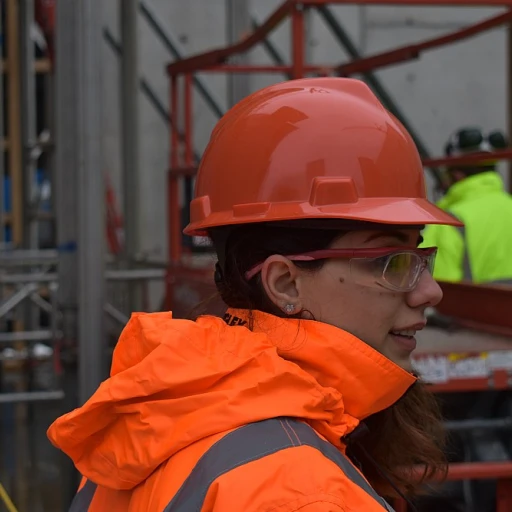
Understanding Project Management Domains
Grasping the Basics of Project Management in Arabian Emirate Companies
In the realm of project management, understanding the distinct domains is crucial for successful project delivery and aligning with the traditional and modern practices in Arabian Emirate companies. These companies often operate across diverse industries, ranging from construction to information technology, each with unique requirements and challenges. Project management domains, as structured by standards like the PMBOK guide, outline key areas essential for ensuring effective and efficient project work. In the context of the Arabian Emirates, project managers must adapt these domains to fit the local business environment, emphasizing collaboration, leadership, and technological adaptation.- Knowledge Areas and Domains: These encompass strategies to manage and coordinate project activities effectively, ensuring maximum performance in each area, such as scope management, risk management, and stakeholder engagement.
- Performance and Life Cycle Stages: A comprehensive understanding of the project life cycle and performance domains allows teams to navigate the intricacies of the project process, enhancing team and work performance.
Cultural Nuances in Team Dynamics
Cultural Sensitivity in Team Environments
In Arabian Emirate companies, achieving effective project work calls for an astute understanding of cultural nuances. The intertwined aspects of tradition and modernity influence how tasks are executed within project domains. Team members from diverse backgrounds bring unique perspectives, creating both opportunities and challenges when striving for cohesive team performance.
The success of projects often hinges on recognizing and respecting the cultural dimensions that shape team dynamics. Stakeholders need to be keenly aware of factors such as communication styles, leadership perceptions, and hierarchical values in the Arabian context. This awareness enhances the ability to navigate project tasks, align team objectives, and support the delivery of performance targets in line with organizational goals.
Moreover, managing uncertainty and risk is firmly tied to cultural awareness. A project's life cycle can be impacted by how risk tolerance and decision-making processes are framed within these cultural settings. Project managers need to possess a nuanced grasp of such dynamics to bolster project success. Effective risk management strategies often involve stakeholder collaboration to devise action plans tailored to cultural contexts.
The guidance offered in the PMBOK Guide emphasizes the importance of approaching team dynamics with cultural sensitivity. By integrating such frameworks, project managers can not only enhance project performance but also foster a sense of unity and purpose among team members across various project domains.
Leadership Styles in the Arabian Context
Adaptive Leadership and Project Teams
In the context of the Arabian Emirates, leadership styles are essential in shaping the performance of project teams. The unique blend of traditional values and modern business practices creates an environment where adaptive leadership is key to project success. Project managers in this region often find themselves navigating a spectrum of leadership approaches, from authoritative systems to more collaborative team dynamics. The PMBOK guide recognizes leadership as a critical component in managing project performance within various domains. In the Emirates, effective leaders are those who engage with their teams, fostering an atmosphere of trust and open communication. This approach not only enhances the commitment of team members but also ensures that the work performance aligns with the project goals. Project teams in the Arabian context frequently consist of diverse cultural backgrounds, leading to a rich mix of insights and perspectives. Managing this diversity requires a leadership style that is adaptable and sensitive to cultural nuances, promoting an inclusive environment that supports the development of the team. By understanding the intricate balance between guidance and autonomy, project managers can drive team performance, mitigating risks associated with uncertainty in project work. Furthermore, the integration of cultural intelligence into leadership practices aids in identifying potential challenges early in the project life cycle. By focusing on these elements, project managers can enhance delivery outcomes. Strategies that emphasize respect, understanding, and dialogue are instrumental in building strong relationships with stakeholders, crucial for the successful performance of projects across various domains. More insights on cultivating an effective team environment, leveraging cultural nuances, and managing performance in complex project domains can be found in the powerful strategies for companies. This resource delves deeper into practices that can bolster project management efforts, ensuring seamless domain management.Technological Integration in Project Management
Leveraging Technological Tools for Enhanced Project Delivery
In the dynamic landscape of Arabian Emirate companies, the integration of technology in project management has become not just a preference, but a necessity. The ability to effectively harness technological innovations can markedly influence project performance and create a competitive edge. Technological advancements play a pivotal role in streamlining project work, facilitating efficient communication among team members, and enhancing overall team performance. Utilizing project management software and tools not only aids in task assignment but also in tracking work performance and meeting delivery timelines. This approach serves as a performance domain that intersects intricately with the lifecycle of project activities.- Communication Tools: Essential for managing remote teams and ensuring cohesive collaboration among stakeholders. Platforms facilitate real-time updates and feedback between the project manager and team.
- Risk Management Software: Critical for identifying and mitigating uncertainties that potentially impede project progression. Technology aids in the preemptive recognition of risks, aligning with PMBOK guidelines to ensure continuous project development.
- Performance Tracking Systems: Provide a clear visibility of individual and collective productivity. They enable project managers to monitor real-time project performance metrics, thus supporting decision-making and ensuring alignment with project objectives.
Challenges in Cross-Border Project Management
Addressing Challenges in Cross-Border Project Management
In the Arabian Emirate companies, navigating cross-border project management can be particularly challenging. Projects often involve stakeholders from diverse cultural backgrounds and time zones, which can complicate coordination and project performance. Additionally, differing regulatory environments and political landscapes can introduce unexpected uncertainties. These elements demand a comprehensive understanding of the multiple project management domains.
To effectively manage these challenges, project managers in the Arabian Emirate must focus on achieving seamless communication. This requires an in-depth understanding of the diverse performance domains and drawing from various knowledge areas to ensure project delivery aligns with the anticipated outcomes. Utilizing a structured development approach assists project managers in maintaining focus on the project goals while accommodating shifts in regulatory requirements and market conditions.
The use of technology plays an essential role in managing cross-border initiatives. Advanced project management tools allow teams to collaborate effectively, despite physical distances. By leveraging platforms that support virtual meetings, file sharing, and real-time communication, teams can improve work performance and sustain momentum throughout the project's life cycle.
A project’s success heavily depends on strategic stakeholder engagement. Identifying each stakeholder group's needs early in the project management process ensures smoother transitions and better risk management. This approach minimizes potential disruptions arising from differences in work cultures or unexpected constraints, ultimately boosting team performance.
Additionally, project managers must be prepared to handle changes in corporate strategy that impact their domains. Adapting swiftly to organizational shifts ensures that project activities stay aligned with broader business objectives, thus maintaining performance integrity across domains. Understanding these complexities and effectively managing cross-border projects remain pivotal for project managers aiming for excellence in this dynamic environment.
Future Trends in Project Management
Anticipating Transformative Trends
The landscape of project management is constantly evolving, and for companies in the Arabian Emirates, aligning with future trends is essential for maintaining competitive advantage. One pivotal aspect is the increasing emphasis on improving project performance through the integration of advanced technologies. These technologies are set to redefine how project domains are managed and executed, potentially leading to more effective delivery and enhanced work performance.
Managing projects in a dynamic environment characterized by rapid technological advancements requires project teams to be adaptable and informed. By leveraging emerging tools, project managers can streamline activities across the project lifecycle, enhancing the performance domains integral to a project's success. The effective utilization of data analytics and artificial intelligence, for example, can empower teams to make informed decisions by analyzing vast datasets related to stakeholder expectations, resource allocation, and risk management.
Additionally, with a more interconnected global market, managing cross-border projects presents both challenges and opportunities. As companies expand their horizons, being prepared for uncertainties becomes a crucial strategy. Encouraging the acquisition of certifications, such as the PMP exam, can further solidify a team's knowledge areas, ensuring they are equipped to tackle complexities that arise in transnational project work.
Team dynamics and leadership styles within Arabian Emirate companies are also anticipated to shift towards more collaborative and inclusive approaches. This change is necessary to accommodate diverse team members and stakeholders involved in a project. Developing a cohesive team that can navigate different cultural nuances and adapt their management approach will be a cornerstone for future success.
To sustain and enhance team performance, continuous team development must be encouraged, promoting a culture of learning and innovation. Leveraging frameworks like the PMBOK guide can provide a structured approach to managing performance domains and addressing risk and uncertainties effectively.













